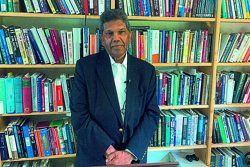As President Obama approaches the mid-point of his term of office at the end of this year, he finds himself confronted by a mix of challenges, many of which have not been of his own making but became part of his inheritance. Certainly after the mid-term elections, the President will be beginning to seriously contemplate his prospects for re-election, and will want to be seen to be satisfactorily terminating mainly external, but also domestic, problems that he promised to resolve during his election campaign.
First, while the President gives the assurance that with the drawdown of fighting forces in Iraq he will have met his promise to end George Bush’s war, he is well aware that, with the Iraqis still unable to form a government after their parliamentary elections in March this year, a sense of continuing political instability prevails in that country. The President knows that if the continuing stalemate does not end soon, the prospects for a new round of internal struggles, and even warfare, between the Shias and the Sunnis will leave an impression in the minds of the American electorate that he has not completed the job in Iraq successfully. The American people will fear that, in such circumstances, the remaining American troops left to continue training and security assistance, may well be drawn into combat again.
Secondly, the President had defended the current American intervention in Afghanistan as a “war of necessity, not a war of choice,” partly to ensure that countries hostile, or with interests different to, the United States did not get a foothold, as had happened when the then Soviet Union sustained the establishment of a Marxist pro-Soviet government there in the 1980s. He has been resolute in insisting that the Karzai administration is the most stable one likely to be available at the moment and must therefore be supported. But over this year doubts have arisen in various quarters in the United States, and indeed from within the administration and the US armed forces in Afghanistan, as to whether a perceived lack of political legitimacy of the Karzai government since the last elections, extensive governmental corruption, and the government’s apparent inability to hold the support of specific strategic areas in Afghanistan for sustained periods, are leading to a embedding of the United States and its forces in a mire not dissimilar to the one which they found themselves in during the Vietnam war.
The incidents relating to the dismissal of General McChrystal from the command of American forces in the country, have not given the American people much confidence that things are going according to plan. While confidence has appeared to be waning, the electorate seems prepared to let the President have the benefit of the doubt, partly because they have some degree of confidence in General Petraeus, the new commander. But again, in recent times, the General has been raising doubts about an early withdrawal from the country.
As has become clear during this year, however, the President’s challenges in Afghanistan do not simply stem from circumstances within the country alone, raising a third challenge. Increasingly doubts have arisen as to the stability and commitment to the US-Nato cause of the Government of Pakistan, America’s key ally in the troubled area. Apart from a perception that Pakistani President Zardari, Benazir Bhutto’s widower, does not have the legitimacy to ensure a sufficient stability and balance among competing political forces in Pakistan, doubts have arisen in American policymaking circles as to whether the strategies of the US and those of Pakistan are consistent with each other. The Pakistani government appears very fearful that the pursuit of the Taliban by the Americans may push them further and further into Pakistan, and lead to instability and new rounds of military activity against them there. The Pakistanis also appear to be undergoing a reduction of confidence in President Karzai, whom, they suspect, is trying to cut a separate deal with the Taliban in order to bolster his regime, as American public opinion seems to be distancing itself from him. This issue has caused contention between the Nato allies, Karzai and Pakistan, with the latter showing its displeasure recently by the arrest of the person claimed to be the Taliban’s chief operational commander.
But the President’s continuing external challenges are almost becoming overshadowed by his domestic challenges. Not least of these is the American electorate’s perception that his administration has not got a grip on the movement of the economy, in spite of the fact that he appeared to have successfully stemmed the challenge of the financial crisis resulting from the sudden meltdown of major American banks and financial institutions. As the public has seen China, a major location of American investment over two decades, continuing to stride ahead with its economic growth in double digits, and sustain very reasonable levels of employment, they seem perplexed that the American economy has been unable to do the same. The polls suggest no sense of gratitude for the President’s success in at least halting the slide, as they see very limited prospects of good times returning as far as growth of employment is concerned.
In the meantime, the Republicans have taken full advantage of the electorate’s uncertainty and fear, and are now attacking his economic policies with full force as the mid-term elections approach, giving no hint at all that Obama inherited the recession from their President Bush. In addition, the leaders of business, including those of the financial sector, appear to give no support to the President for his efforts in rescuing their fortunes, while at the level of the academic and policy-making elite, fierce debate continues as to the wisdom of the policy that the President is now pursuing.
In these circumstances, new fears are arising about the ability of the President, so lauded as a campaigner just over two years ago, to be a successful standard bearer for the Democrats, taking them to victory in the Senate and the House in the coming elections. The polls show that the President is still well liked, but that confidence in his policies has dramatically diminished.
But a little gleam of light has seemed to arise in respect of another external challenge, as the Administration has been able to announce the agreement of Palestinian President Mahmoud Abbas and Israeli Prime Minister Netanyahu, to resume talks on finding a solution to the issue of the need for a Palestinian state. This is seen as an initial success for the strategy pursued by Secretary of State Hillary Clinton and the President’s Special Representative, former Senator George Mitchell.
The Palestinian issue is, of course, related to another troublesome challenge to the President, the Iranian pursuit of a level of nuclear fission capability, and that country’s intense interest in the outcome of the Iraqi political settlement as the Americans withdraw from that country. Obama will be taking strong interest in the evolution of these interdependent challenges in the Middle East, to ensure that, as the last year of his administration rolls around, he can claim credit for a general calming of the situation in that area.









